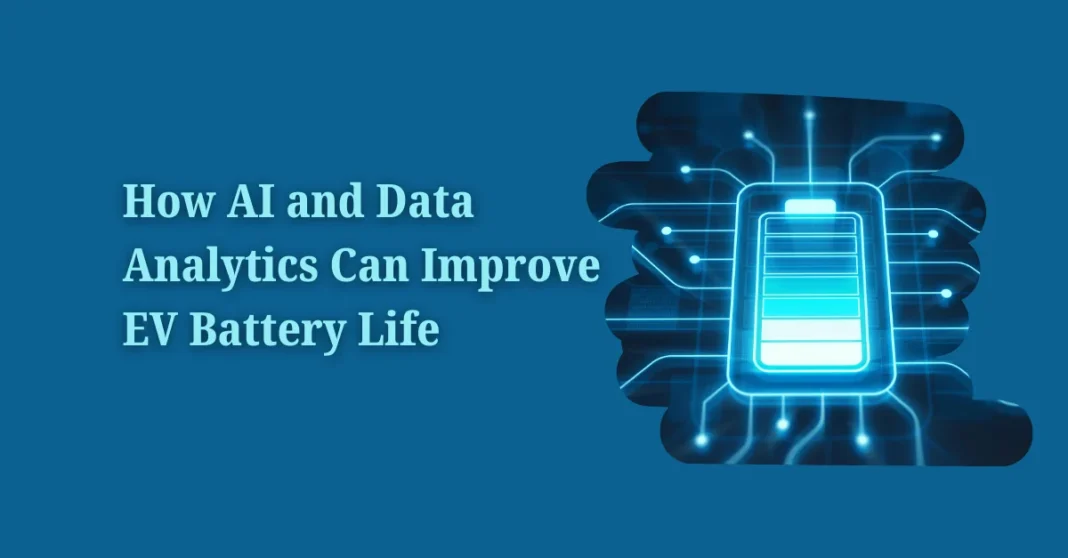As electric vehicles (EVs) continue to gain traction, battery life remains a critical factor in their adoption and long-term viability. Fortunately, Artificial Intelligence (AI) and Data Analytics are stepping in to help address this challenge, offering solutions that not only improve battery longevity but also optimize vehicle performance.
1. Predictive Battery Health Monitoring
AI-powered systems can analyze vast amounts of data from an EV’s battery to predict its health and remaining useful life. By continuously monitoring metrics such as temperature, charge cycles, voltage, and current, AI can detect signs of degradation or potential issues that might lead to a shortened lifespan.
- Example: AI algorithms can predict when a battery is likely to lose capacity or experience failure, allowing for proactive maintenance or replacement.
2. Optimizing Charging Patterns
Charging practices significantly impact battery health. Data analytics can help develop personalized charging strategies by analyzing user behavior, driving habits, and environmental factors like temperature. AI can recommend the optimal time and speed for charging, reducing unnecessary strain on the battery and helping to avoid overcharging or deep discharging.
- Example: Charging algorithms might suggest slower, overnight charging instead of fast-charging, which generates more heat and accelerates battery wear over time.
3. Battery Thermal Management
Temperature extremes—whether too hot or too cold—are among the top reasons batteries degrade prematurely. AI models can predict and optimize thermal management systems within EVs to keep batteries at the ideal operating temperature. By analyzing real-time data, AI can adjust cooling or heating systems, ensuring the battery performs efficiently and lasts longer.
- Example: Machine learning models can dynamically adjust the cooling system based on real-time driving conditions, preventing overheating during rapid acceleration or long-distance travel.
4. Energy Usage Optimization
AI can also optimize how energy is distributed and used within an EV, enhancing overall efficiency. By analyzing driving patterns, road conditions, and even traffic data, AI can ensure that the battery’s energy is used in the most efficient way possible.
- Example: During city driving with frequent stops, AI may optimize regenerative braking to recover more energy, helping to extend the range and lifespan of the battery.
5. Data-Driven Battery Design and Improvement
AI and machine learning algorithms can accelerate battery research and development by analyzing data from real-world EV performance. This data can be used to discover insights into how different battery chemistries or designs perform over time, helping manufacturers create batteries that are more durable and energy-efficient.
- Example: AI-driven simulations can test various battery materials to identify those that offer the best balance of longevity, performance, and cost.
6. Battery Management Systems (BMS) Enhancement
The Battery Management System (BMS) is the brain of the EV battery, responsible for monitoring and managing each cell’s performance. AI can enhance BMS by improving real-time decision-making processes, ensuring each cell is balanced and operated within optimal parameters.
- Example: AI can improve algorithms for voltage balancing and temperature regulation at the cell level, which reduces the likelihood of battery damage caused by imbalanced charge/discharge cycles.
7. Fleet Management for Commercial EVs
For businesses using electric fleets, AI and data analytics can optimize fleet battery usage and maintenance schedules, ultimately extending battery life across the entire fleet. AI can analyze usage patterns across multiple vehicles to identify trends, predict failures, and schedule battery replacements before they cause downtime.
- Example: AI tools can help fleet managers determine which vehicles require charging or maintenance based on data, reducing wear and tear and increasing overall fleet efficiency.
Conclusion
The integration of AI and data analytics into electric vehicle battery management is transforming the way batteries are designed, monitored, and maintained. By using real-time data, machine learning models, and predictive analytics, EV manufacturers and fleet operators can extend battery life, improve performance, and enhance the overall efficiency of electric vehicles.
As we move toward a more sustainable and connected future, these technologies are critical to ensuring that EVs continue to deliver on their promise of lower emissions, reduced operating costs, and a longer lifespan.
#AI #DataAnalytics #EVBattery #ElectricVehicles #BatteryTech #PredictiveMaintenance #GreenTech #EVInnovation #Sustainability #SmartTech #Autotech #EVFleet #EnergyEfficiency

